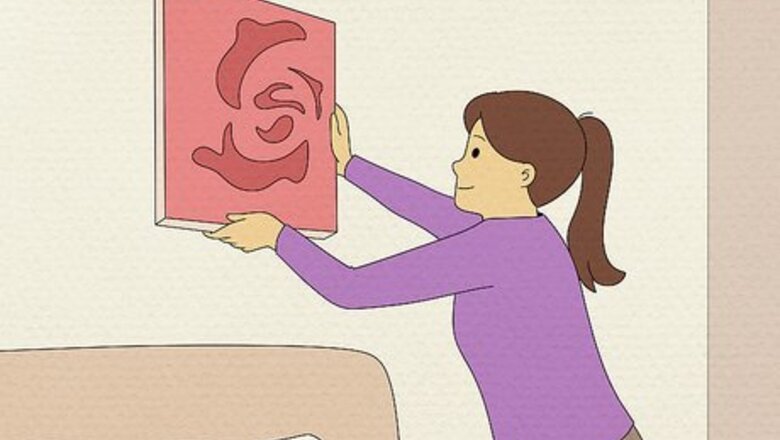
views
Making Your Home a Calming Space
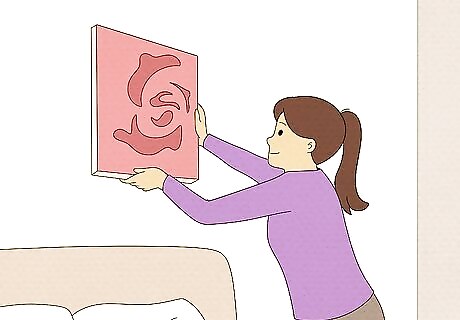
Make your surroundings appealing. When your environment is chaotic, it’s difficult to feel relaxed. Making small changes to your surroundings can help your home feel like a refuge from the chaos, rather than part of it. It’s important to address your space’s visual appeal and cater to your own individual taste. Even small changes, like rearranging furniture or adding a piece of art, will make your space more visually appealing. To brighten up your space on a budget, you can add colorful pillows, flowers, or a plant.
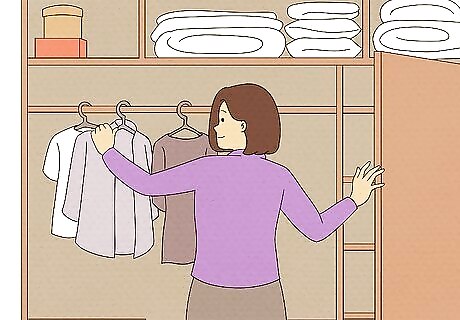
Clean up your space. This is vital to creating a relaxed atmosphere. If you have an especially messy place, start small, with a single space like a desk or closet, and work your way up to larger spaces. This might seem daunting at first, but if you dedicate time each day to working on decluttering, then soon you will be able to reap the benefits of a clean, calming environment. When you declutter your closet, get rid of any clothing that you don't love or haven't worn in the past year. If cleaning and organizing seem overwhelming, search online for professional cleaning companies.
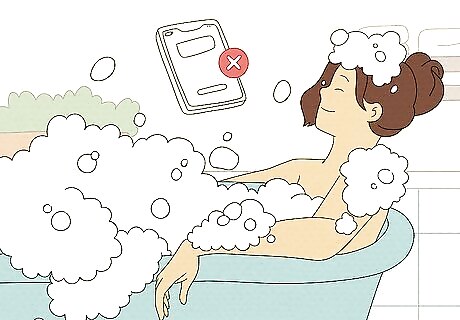
Turn off electronics when you can. Constantly checking emails and social media can generate stress, especially if you are a student or employee who brings your work home with you. Make an effort to unplug in the evenings if you can. Try alternative activities to relax, like reading or taking a hot bath instead of staring at a screen all night. Unplugging is especially important to do before bedtime, as studies have shown that the blue light emitted from electronic devices can inhibit melatonin production and hurt your sleep quality.
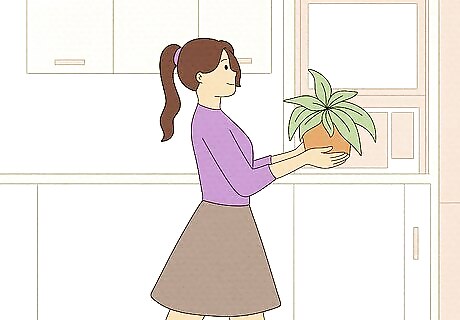
Bring nature inside. Keeping plants or flowers on display de-stresses the atmosphere of your space and helps purify the air. Some great choices include the aloe vera plant, which contains a gel that soothes burns and cuts, or the rubber tree plant, which is great for novice plant owners and has strong air purifying abilities.
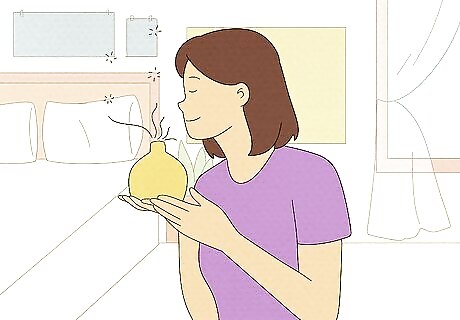
Find a scent you love and spread it throughout your space. Avoid scents that are too pungent or overwhelming. Instead, focus on calming scents like lavender, chamomile, or even chocolate, which have been proven to have relaxing effects. Use scent diffusers or candles for subtly incorporating relaxing scents and ambiance. Scents to generally avoid for relaxation include grapefruit, cinnamon, and peppermint, as these promote alertness and are energizing.
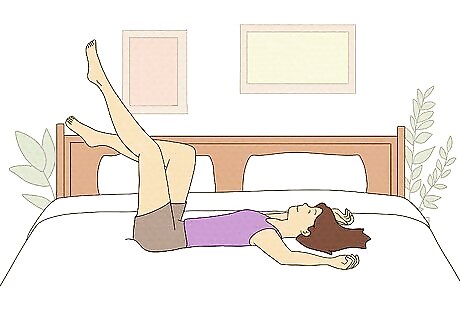
Invest in a quality mattress and bedding. Nowhere is relaxation more important than your bedroom. Since you will spend roughly one-third of your life in bed, it’s important that your bed and bedding create a relaxing space for you to recharge. Invest in a comfortable mattress and bedding. See this article for suggestions on how to Buy a Bed. Be aware that memory foam mattresses are well known for trapping heat. You may want to invest in a cooling gel mattress-topper to offset the trapped heat.
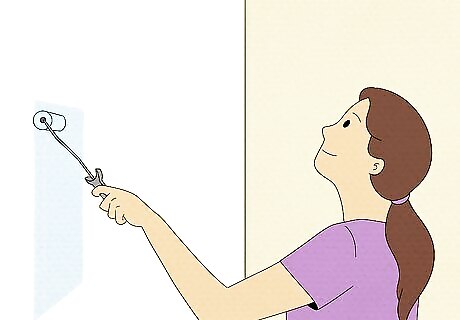
Incorporate tranquil paint colors throughout your space. Shades of blues, greens, and grays all inspire relaxation. Neutrals like ivory and beige are also great choices. Avoid bright, vivid paint colors, as well as too many different colors, which tend to energize rather than relax. Save vivid paint colors for accent colors on items like pillows or throws, rather than painting entire rooms with them.
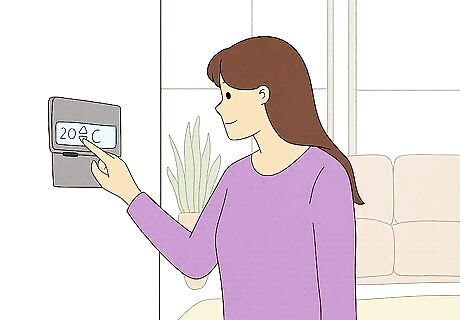
Adjust your thermostat to a temperature that makes you the most comfortable. Slightly cool indoor temperatures tend to make a space seem more relaxing. Approximately 68 to 70 degrees is a comfortable indoor temperature. For relaxation for sleeping, go a bit cooler to about 65 degrees for optimal rest.
Reducing Audible Stressors
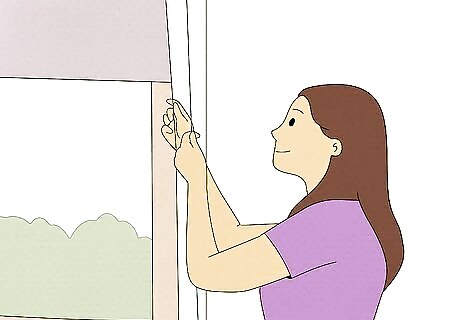
Eliminate noise and distractions. Noise from loud neighbors, noisy traffic, or nearby construction can cause stress and make your otherwise tranquil space stressful. Minimizing these distractions and incorporating peaceful sounds helps promote calm and relaxation in your space. Blackout curtains help eliminate noise, as do double or triple-paned windows.
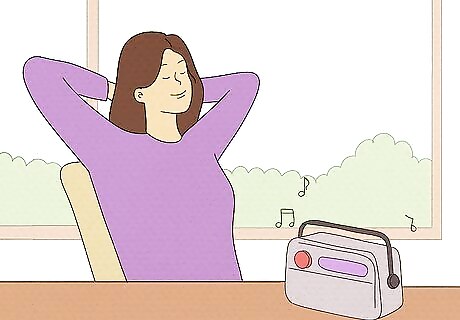
Play some calming music. Studies have shown that playing music promotes relaxation, even in stressful environments. Music therapy is even gaining popularity among pediatricians as a successful means of calming children who undergo medical procedures. To reap the most calming benefits in your space, play calming, lyric-free music. Sounds of nature or a smooth jazz sound are great choices.
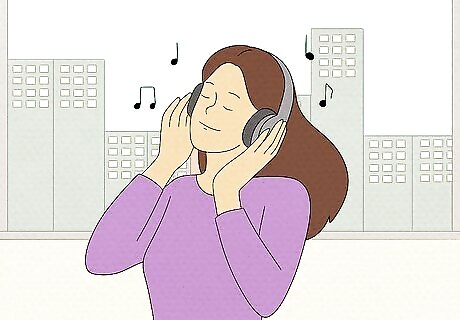
Block out unnecessary noise at work. For a relaxing work environment, invest in noise canceling headphones. If you work in an office or other location that permits the use of headphones, noise canceling headphones will decrease the amount of stressful noise that you will deal with while you work. These come in on/over the ear styles and earbuds. Regardless of which style you choose, make sure that your choice feels comfortable in/on your ears.
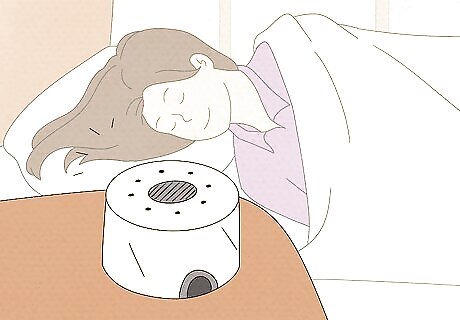
Buy a quality white noise machine. In addition to a comfortable mattress and bedding, a quiet environment is vital for optimal relaxation before bedtime. White noise machines help drown out stressful background noise from loud neighbors or busy streets. Choose a white noise machine with a variety of sound options and volume settings so you can customize your sound. Premium white noise machines run off an actual motor and internal fan, rather than simply making noise that sounds like a running fan.
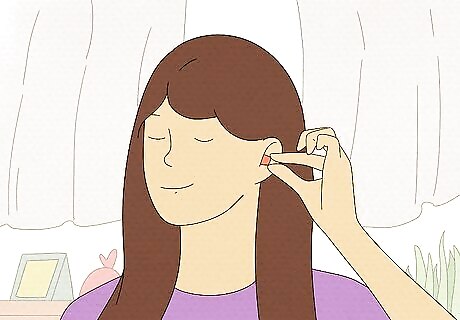
Buy earplugs. If you would prefer to save your cash, an inexpensive way to reduce audible stressors is to buy earplugs. You can find these at any drugstore or hardware store. Look for plugs that are made of cushiony foam and have a 33 decibel reduction (the highest rate reduction for earplugs).
Incorporating Self-Care Techniques
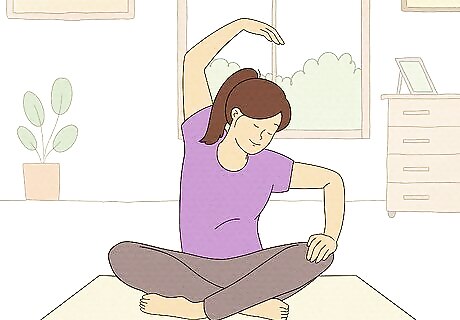
Pay attention to your physical needs. Even though creating a relaxing atmosphere is important, the most relaxing environment can’t make up for feeling physically and mentally drained. Coupling mental and physical care with your relaxation strategies will enable you to reap greater benefits.
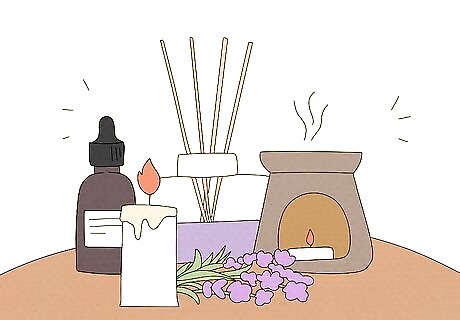
Integrate aromatherapy into your routine. Aromatherapy for relaxation has been proven to work to relieve both stress and pain. Calming effects come from oils like vanilla, rose, or geranium. Less physical pain and stress will help you relax and find calm. Mix your aromatherapy with water in a spray bottle and keep it in your car or in your purse or briefcase to use it on the go.
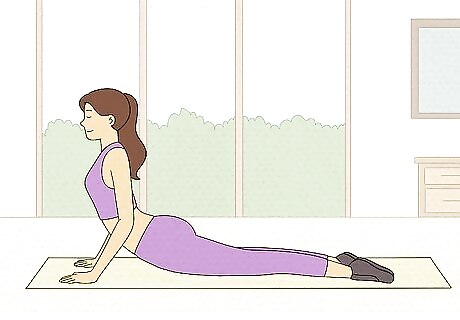
Practice yoga or guided meditation. Calming exercises like yoga or Tai Chi can help you relax, reduce stress, and reap health benefits like lower blood pressure and lower pulse rate. See this article on how to Do Yoga Meditation for suggestions on incorporating yoga techniques for relaxation.

Try vitamin D supplements. Studies have shown that supplementing with vitamin D, the "Sunshine Vitamin," can boost mood. If you prefer not to take a tablet, you can try stepping outside for fifteen minutes to get your RDA of vitamin D. You can find supplements at any drugstore or health food store.

Play with your pet. If you have a dog, cat, pot-bellied pig, or other pet, play with it! Spending quality time with your pet can relax you, comfort you, and even reduce blood pressure and risks for obesity. Aim for thirty minutes a day playing with or briskly walking your pet to maximize the relaxing benefits. See this article for tips on how to Have Fun with Your Dog Outdoors.

















Comments
0 comment